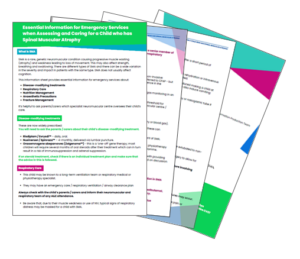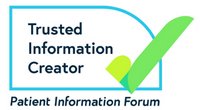Essential Information for Emergency Services when Assessing and Caring for a Child who has Spinal Muscular Atrophy
Essential Information for Emergency Services when Assessing and Caring for a Child who has Spinal Muscular Atrophy
Any child with SMA should have an individual Emergency Healthcare Plan (EHP). This is a written plan of action that any medical team can follow should a child become unwell.
Sometimes families need to take their child to Accident and Emergency (A&E) Services at a local hospital. Frequently, clinical staff there will not have come across SMA. We have worked with clinical experts to produce an information sheet for families to give to the A&E team, along with any individual EHP they may have. It provides information that will assist them with their assessment of the needs of a child with SMA.
You may want to:
- download a copy
- bookmark this page
- ask us to send you a printed copy via our Publications Order Form >.
SMA is a rare, genetic neuromuscular condition causing progressive muscle wasting (atrophy) and weakness leading to loss of movement. This may also affect strength, breathing and swallowing. There are different types of SMA and there can be a wide variation in the severity and impact in patients with the same type. SMA does not usually affect cognition.
These are now widely prescribed:
Risdiplam / Evrysdi™ – daily, oral.
Nusinersen / Spinraza™ – 4-monthly, delivered via lumbar puncture.
Onasemnogene abeparvovec /Zolgensma™ – this is a ‘one-off’ gene therapy; most children will require several months of oral steroids after their treatment which can in turn result in a risk of immunosuppression and adrenal suppression.
- This child may be known to a long-term ventilation team or respiratory medical or physiotherapy specialist.
- They may have an emergency care / respiratory ventilation/ airway clearance plan.
- Be aware that, due to their muscle weakness or use of NIV, typical signs of respiratory distress may be masked for a child with SMA.
Always:
- Fatigue or altered level of consciousness.
- Altered capillary blood gas.
Consider whether ventilatory support is needed. Early support with non-invasive ventilation may be effective. In the majority of instances BiPAP is preferred to CPAP – but needs to be delivered / coordinated by a specialist team with experience in the management of neuromuscular conditions.
Note that high dose oxygen alone should not be given without blood gas monitoring in an unventilated child with SMA as it may suppress respiratory drive.
If symptoms of respiratory distress continue or are severe, have a low threshold for intubation with urgent consultation with the child’s specialist neuromuscular centre / respiratory team.
Arrange chest x-ray and treatment with antibiotics.
Monitor oxygen saturations and carbon dioxide clearance (capnography or blood gas).
Review use of anticholinergics (e.g., oral glycopyrrolate or hyoscine), as these can increase the risk of mucous plugging and may need to be discontinued.
Be aware that Respiratory Physiotherapy is a vital part of the management of SMA:
- Ask parents / guardians for their child’s most up to date respiratory physiotherapy programme and about their child’s routing airway clearance programme.
- If the parents are competent and confident, they can ask to assist with providing care themselves during their child’s stay if clinically appropriate and on discussion with the child’s physiotherapy / medical team
Secretion clearance is critically important in the management of acute infection in SMA and early assessment by a respiratory physiotherapist is essential.
Respiratory physiotherapy techniques, nebulisers (saline, hypertonic saline, salbutamol, DNAse), antibiotics and suction may all be required to maintain airway patency.
Remember to review medical records which may contain patient-specific advice including care pathways.
Remember to ask if this child has a Feeding Plan.
As a result of low muscle mass, hypoglycaemia can occur after a short period of ‘starvation.
Always check a BM / laboratory glucose level.
Avoid prolonged fasting; have a low threshold for starting oral rehydration or intravenous fluids including dextrose if normal enteral feeding is not tolerated.
Be aware that during a period of illness gut motility may be reduced making a child at higher risk of vomiting or aspiration. The strain of coughing can also induce vomiting:
- Consider a move to continuous or slower feeds.
- Consider the use of a free-drainage bag on their gastrostomy or nasogastric tube if they have one to minimise their risk of vomiting.
SMA may increase the risk of complications with anaesthetics:
Aspiration risk.
Limited mouth opening.
Non-reversible muscle relaxant agents should be avoided.
Recovery of breathing may take longer, and children may need to be extubated to non-invasive ventilation.
High dependency or intensive care facility should be routine post-surgery to allow for appropriate post-operative monitoring.
Children with SMA may have low bone density. Stress or low impact fractures may occur.
Have a low threshold for considering fracture in those complaining of bone pain or distress with movement or handling with a relevant history.
An x-ray is recommended in all cases of suspected fracture.
Was this page useful?
 Version 1
Version 1
Author: Clinical Experts with the SMA UK Information Production Team
Published: August 2023
Review due: July 2026
This page provides information. This is meant to support, not replace, clinical and professional care.
Find out more about how we produce our information.
